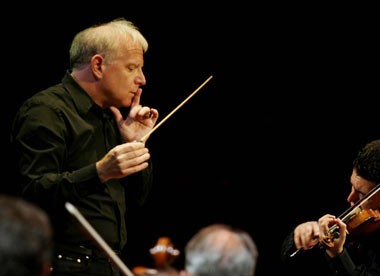I’m sorry- there’s simply no way that Leonard Slatkin is 70 years old.
For many, many American conductors and orchestral musicians of my generation, Leonard was the first superstar conductor who seemed of our time and of our culture. Before Leonard, conductors were mostly mute, brooding, enigmatic figures with accents and capes. Even that other famous Leonard seemed more a product of an already distant golden age. I first encountered Leonard Slatkin via the Saint Louis Symphony’s syndicated weekly radio broadcasts. In those halcyon days, one could hear a live broadcast of one of the great American orchestras every night of the week, and Saint Louis, at that time the kid brother alongside the giants in New York, Cleveland and Chicago, stood out under Leonard’s leadership not only for their virtuosity but for the astonishing breadth of their repertoire. Even then, I had the conducting bug, and I was fascinated to hear Leonard speak about music from Adams to Bruckner with genuine musical insight, wit and heart. To the extent I ever heard any of my other favourite conductors speak back then, they all seemed to sound either like one of Tolkien’s wizards or a Bond villain. Leonard was refreshingly American- direct, funny and wise. He was the first one that seemed be living in the world I was growing up in. It simply can’t be that he’s now 70.
That I would one day get to study with the man whose radio broadcasts had already taught me so much is one of life’s little delights. In 2001, I had the great privilege to participate in the National Conducting Institute at the Kennedy Center in Washington. Leonard set up the NCI to give conductors with the talent and aspiration to lead major orchestras a chance to cut their teeth with the National Symphony Orchestra. To have a musician with Leonard’s vast experience at your side discreetly advising you on matters both musical and psychological is surely the best possible way to find your confidence working with 100 musicians of vast experience. However, Leonard is never one to hog the limelight- he made sure we all had mentors from within the orchestra also giving us feedback our work after each session. After the NCI, when I would occasionally return to Washington as a cover conductor, Leonard was also generous in sharing his time and experience. I particularly treasure my memory of a short session we had on Mahler’s Second Symphony that Leonard squeezed in between an NSO rehearsal and a session on Corigliano’s Second Symphony with the President’s Own across town. Leonard’s teaching is short of philosophical gobbledegook and long on plain-spoken insight. Every single thing he said in those few minutes proved to be pricelessly useful when I conducted the piece for the first time the following week.
The sheer mathematic’s of Leonard’s accomplishment defies understanding, starting with the number three. To have led the three orchestras in Saint Louis, Washington and now Detroit puts him in a most elite club- only Lorin Maazel has led three American orchestras of similar standing. The ultimate achievement for any conductor must be to build a great orchestra- something Leonard did early in his career in Saint Louis. Today we see him re-building a great orchestra in Detroit that has come through difficult times in his own image- savvy, visionary and virtuosic. And then there is the breadth of Leonard’s repertoire. For many years, we’ve gathered yearly “repertoire reports” on favourite colleagues and friends at my blog- an annual summary of every piece someone has conducted that year. Every year, it is Leonard whose repertoire list dwarf’s everyone else, and it’s a list that always includes many premieres, oddities, tricky accompaniments and mega-works. Put simply, Leonard seems to effortlessly conduct about twice as many pieces as anyone else in the business every year, and he does an astounding range of repertoire so well. His contributions to American music are well known and rightly celebrated, but he’s also great Anglophile, having made great recordings of works by Elgar and Vaughan Williams. Not long ago, I was in a friend’s car- he was playing a CD of the Brahms D Major Serenade, and it immediately struck me as one of the best performances I’d heard of the piece. It’s a personal favourite, but few conductors bother with it, and fewer still do it well. Of course, when I asked, I discovered it was not some glowering Teutonic maestro conducting, but Leonard.
Having gone on so long, I must mention one more aspect of Leonard’s musicianship. Conductors are here to be argued over- people may love or hate your way with Brahms or Mahler- but there’s one aspect of Leonard’s conducting that is, in my opinion, beyond debate. He’s simply one of the most phenomenal accompanists who have ever stood upon the podium. Accompanying is the most demanding part of any conductor’s job. To do it well takes real technique, a gift for anticipation, flexibility, empathy, and a sense of when to lead and when to follow. It’s a job I don’t think anyone in the business does better than Leonard. I’ve heard innumerable soloists say the same thing, and veteran soloists tend to be even tougher on conductors than orchestral musicians. Leonard has one of the most remarkable skill-sets of any conductor I’ve come across- an astounding ear, an ability to grasp almost any style, a consummate stick technique and an ability to find simple and pragmatic solutions to complex musical problems. In a field not generally associated with humility, Leonard is always ready to deploy that skill set in support of a soloist or a world preimere with the same youthful zeal he brings to the great symphonic works.
70 is young for a conductor, but forget 70. Leonard remains a conductor for our time and for tomorrow. Happy forty-fifth birthday, Leonard!

Recent Comments